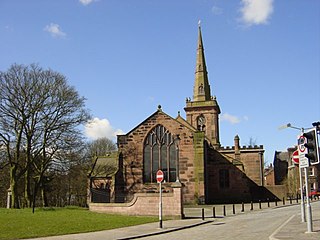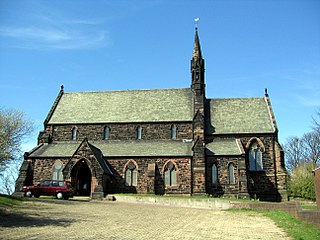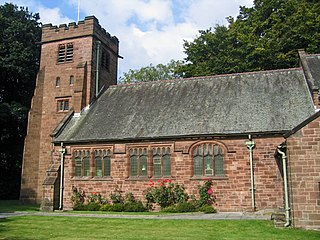
Grinling Gibbons was an Anglo-Dutch sculptor and wood carver known for his work in England, including Windsor Castle, the Royal Hospital Chelsea and Hampton Court Palace, St Paul's Cathedral and other London churches, Petworth House and other country houses, Trinity College, Oxford and Trinity College, Cambridge. Gibbons was born to English parents in Holland, where he was educated.

The Green Man, also known as a foliate head, is a motif in architecture and art, of a face made of, or completely surrounded by, foliage, which normally spreads out from the centre of the face. Apart from a purely decorative function, the Green Man is primarily interpreted as a symbol of rebirth, representing the cycle of new growth that occurs every spring.

Prescot Parish Church, also known as St Mary's Church, is in the town of Prescot, Merseyside, England. It is recorded in the National Heritage List for England as a designated Grade I listed building, and is an active Anglican parish church.

St Laurence's Church, Ludlow, is a Church of England parish church in Ludlow, Shropshire, England. It is a grade I listed building.

St Martin, Ludgate, also known as St Martin within Ludgate, is an Anglican church on Ludgate Hill in the ward of Farringdon, in the City of London. The church is of medieval origin, but the present building dates from 1677 to 1684 and was designed by Sir Christopher Wren.

St Mary's Church is an Anglican parish church in Nantwich, Cheshire, England. The church is recorded in the National Heritage List for England as a designated Grade I listed building. It has been called the "Cathedral of South Cheshire" and it is considered by some to be one of the finest medieval churches, not only in Cheshire, but in the whole of England. The architectural writer Raymond Richards described it as "one of the great architectural treasures of Cheshire", and Alec Clifton-Taylor included it in his list of "outstanding" English parish churches.

Holy Trinity Church is in Runcorn, Cheshire, England. It is an active Anglican parish church in the diocese of Chester, the archdeaconry of Chester and the deanery of Frodsham. Its benefice is combined with that of All Saints, Runcorn. It is recorded in the National Heritage List for England as a designated Grade II listed building.

St Mary's Church is in Halton, which was formerly a separate village, but is now part of the town of Runcorn, Cheshire, England. It is an active Anglican parish church in the diocese of Chester, the archdeaconry of Chester and the deanery of Frodsham. The church is recorded in the National Heritage List for England as a designated Grade II listed building.

St Leonard's Church is in the village of Warmingham, Cheshire, England. The church is recorded in the National Heritage List for England as a designated Grade II* listed building. It is an active Anglican parish church in the diocese of Chester, the archdeaconry of Macclesfield and the deanery of Congleton. Its benefice is combined with that of St Peter, Minshull Vernon.

St Michael and All Angels Church is in the village of Crewe Green, Cheshire, England. The church is recorded in the National Heritage List for England as a designated Grade II* listed building. It is an active Anglican parish church in the diocese of Chester, the archdeaconry of Macclesfield and the deanery of Nantwich. Its benefice is combined with that of St Matthew, Haslington.

St John the Evangelist's Church is in the village of Sandiway, Cheshire, England. It is an active Anglican parish church of Sandiway and Cuddington in the diocese of Chester, the archdeaconry of Chester and the deanery of Middlewich. The church is recorded in the National Heritage List for England as a designated Grade II listed building.

Stanton St. John is a village and civil parish in Oxfordshire, England, about 4.5 miles (7 km) northeast of the centre of Oxford. The village is 330 feet (100 m) above sea level on the eastern brow of a group of hills northeast of Oxford, in a slight saddle between two of the hills.

All Saints Church is a redundant Anglican church in the village of Wordwell, Suffolk, England. It is recorded in the National Heritage List for England as a designated Grade I listed building, and is under the care of the Churches Conservation Trust. It stands in a small community alongside the B1106 road between Bury St Edmunds and Brandon.

St Andrew's Church is a partly redundant Anglican church in the hamlet of Covehithe in the English county of Suffolk. It is recorded in the National Heritage List for England as a designated Grade I listed building, Part of the church is in ruins and this is under the care of the Churches Conservation Trust. The church stands on a lane leading directly towards the sea, in an area of coast which has suffered significant ongoing erosion. The parish of Covehithe has been combined with neighbouring Benacre.

St Mary's Church is in the village of Yealand Conyers, Lancashire, England. It is an active Roman Catholic church in the diocese of Lancaster, and is linked with the churches of St Mary of the Angels, Bolton-le-Sands, and Our Lady of Lourdes, Carnforth. The church is recorded in the National Heritage List for England as a designated Grade II listed building. It stands at the south end of the village.

St Peter's Church is in Middlewich Road, Minshull Vernon, Cheshire, England. It is an active Anglican parish church in the deanery of Nantwich, the archdeaconry of Macclesfield, and the diocese of Chester. Its benefice is combined with that of St Leonard, Warmingham. The church is recorded in the National Heritage List for England as a designated Grade I listed building. It was a Commissioners' church, having received a grant towards its construction from the Church Building Commission.

Art in early modern Scotland includes all forms of artistic production within the modern borders of Scotland, between the adoption of the Renaissance in the early sixteenth century to the beginnings of the Enlightenment in the mid-eighteenth century.

The Church of St John the Divine is in Burnley Road, Holme Chapel, a village in the civil parish of Cliviger, near Burnley, Lancashire, England. It is an active Anglican parish church in the diocese of Blackburn, and the church is recorded in the National Heritage List for England as a designated Grade II listed building. It was built between 1788 and 1794, replacing a small chapel, and is in simple Classical style. Above the west front is a bell turret with an octagonal cupola, and inside the church are carved oak stalls, moved from a demolished church, which include a poppyhead and misericords.

The Church of St Mary the Virgin, Ivinghoe, is a Church of England, Grade I listed church in the village of Ivinghoe, Buckinghamshire, in the United Kingdom. It stands on the main High Street of the village surrounded by a churchyard.




















